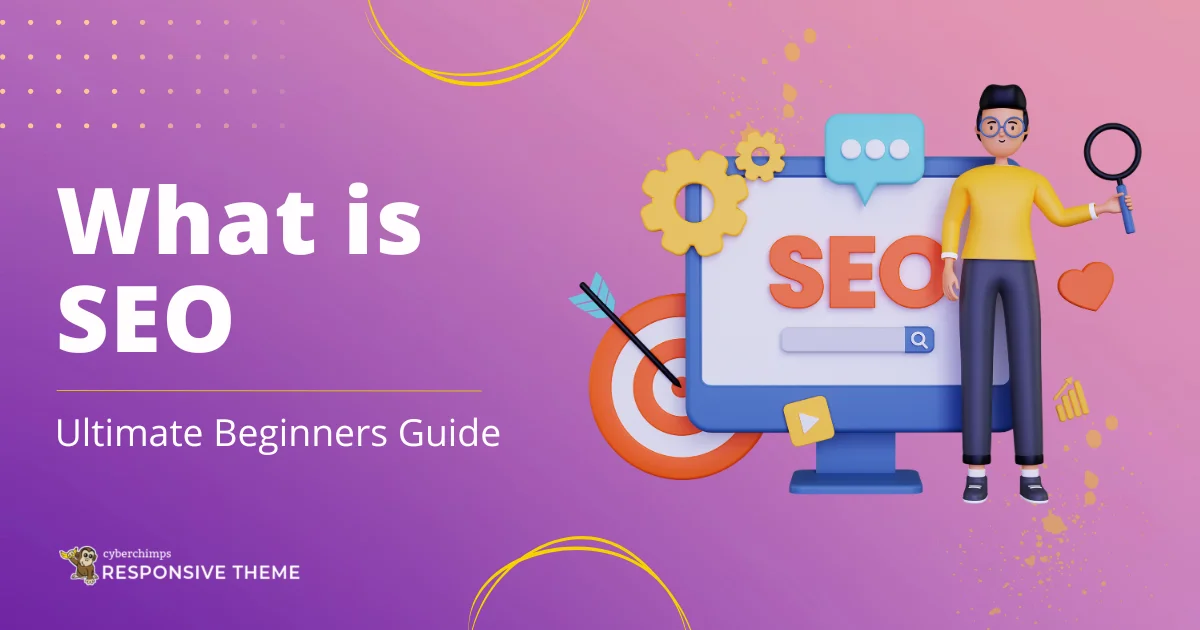SEO stands for Search Engine Optimization.
It’s a practice of getting traffic to your website from searches performed in search engines like Google, Bing and other search engines.
SEO helps in ranking your website higher in Search Engine Results Pages(SERPs) whenever a user searches for a product or service that you sell.
If you were searching for “What is SEO,” this article will help you understand the basics of SEO.
You’ll learn On-page SEO, Off-page SEO, backlinks and a lot more.
Keep reading.
- What is SEO (Search Engine Optimization)?
- Why is SEO Important?
- Understand How Search Engines Work?
- What are Organic Results vs. Paid Results
- What are Backlinks?
- Factors that Influence Search Engine Rankings
- SEO Strategies: Black Hat vs. White Hat
- How Much Time Does SEO Take?
- How Much Does SEO Cost?
- Frequently Asked Questions
- Conclusion
What is SEO (Search Engine Optimization)?
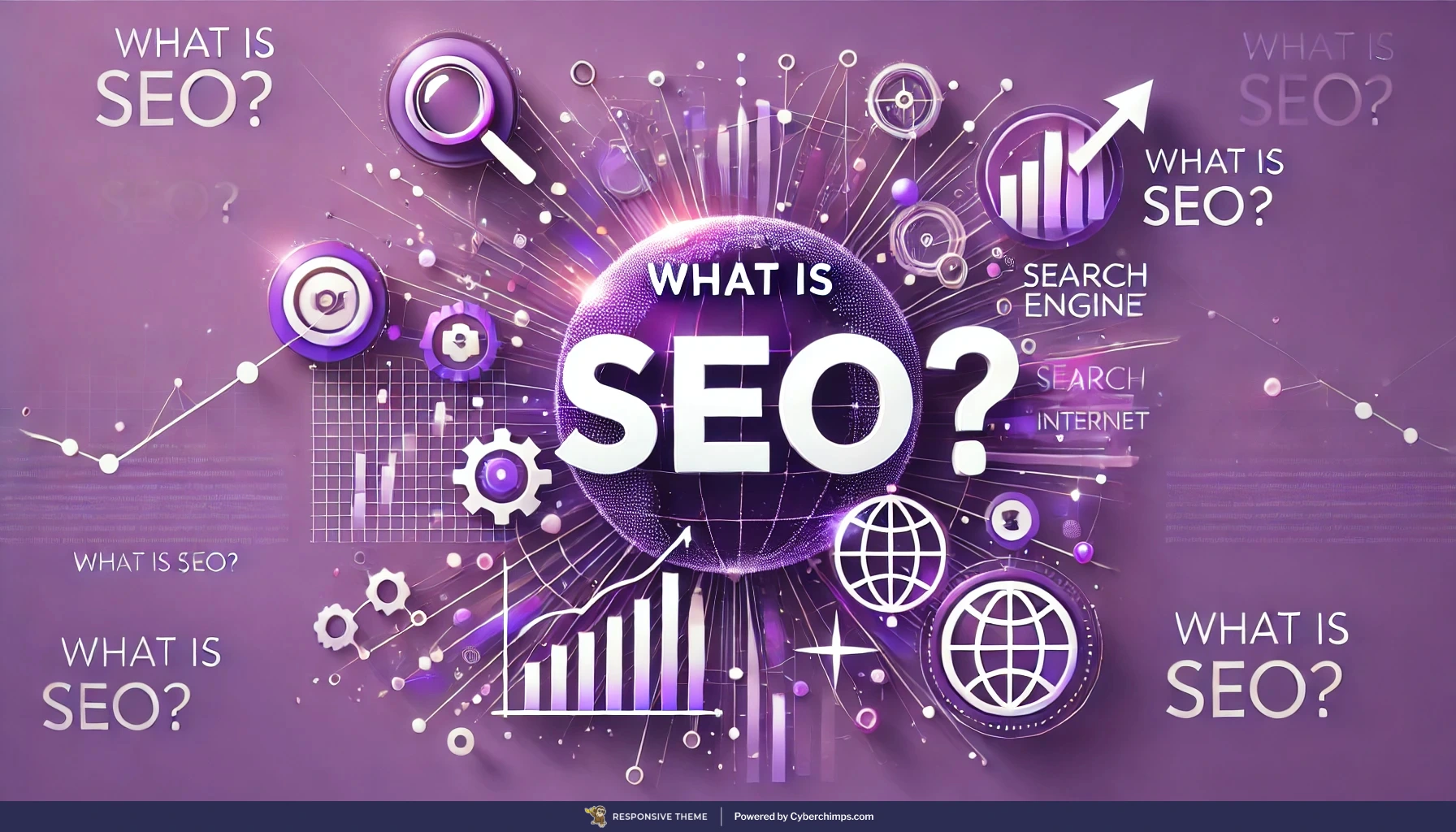
As mentioned earlier, the full form for SEO is Search Engine Optimization. It’s a process that aims to optimize website pages to rank higher in search engines like Google and Bing.
SEO is an organic way to rank your website when someone searches for a keyword. Here, the emphasis is on the content and how it helps searchers answer their queries.
Unlike SEO, there is another way to rank directly at the top in search engines: pay-per-click (PPC). It’s like paying Google a fee to get a click for a specific keyword search.
Depending on the industry type and the product being sold, companies choose a combination of SEO and PPC to rank their business websites.
This is just the starting point when it comes to learning SEO. Keep reading to understand why SEO is important for businesses and how search results work on the Internet.
Why is SEO Important?
Over a billion searches are conducted on Google alone every day. These are the numbers from only a single search engine.
The actual number of searches is much higher if we combine text platforms with video platforms like YouTube, TikTok, and others.
Imagine the keyword people are searching for that will lead to your business website. Even if only a fraction of the people land on your website, it will greatly boost your business sales.
Ultimately, everyone wants their business at the top when somebody looks for a product they sell. And you can rank higher with SEO.
Therefore, SEO is crucial to marketing your business on search engines.
Another important aspect is that business owners who cannot spend money on paid advertising can also adopt SEO. So, if you implement SEO, link-building, and write valuable content, SEO will give you good returns in the long run.
Understand How Search Engines Work?
Search has primarily two tasks:
- Maintain a search index: Crawl all the content submitted for indexing by business owners and maintain a search index.
- Show rankings: Whenever a user searches for a keyword, search engines run various algorithms to show the results.
Search Engines traditionally work in three stages:
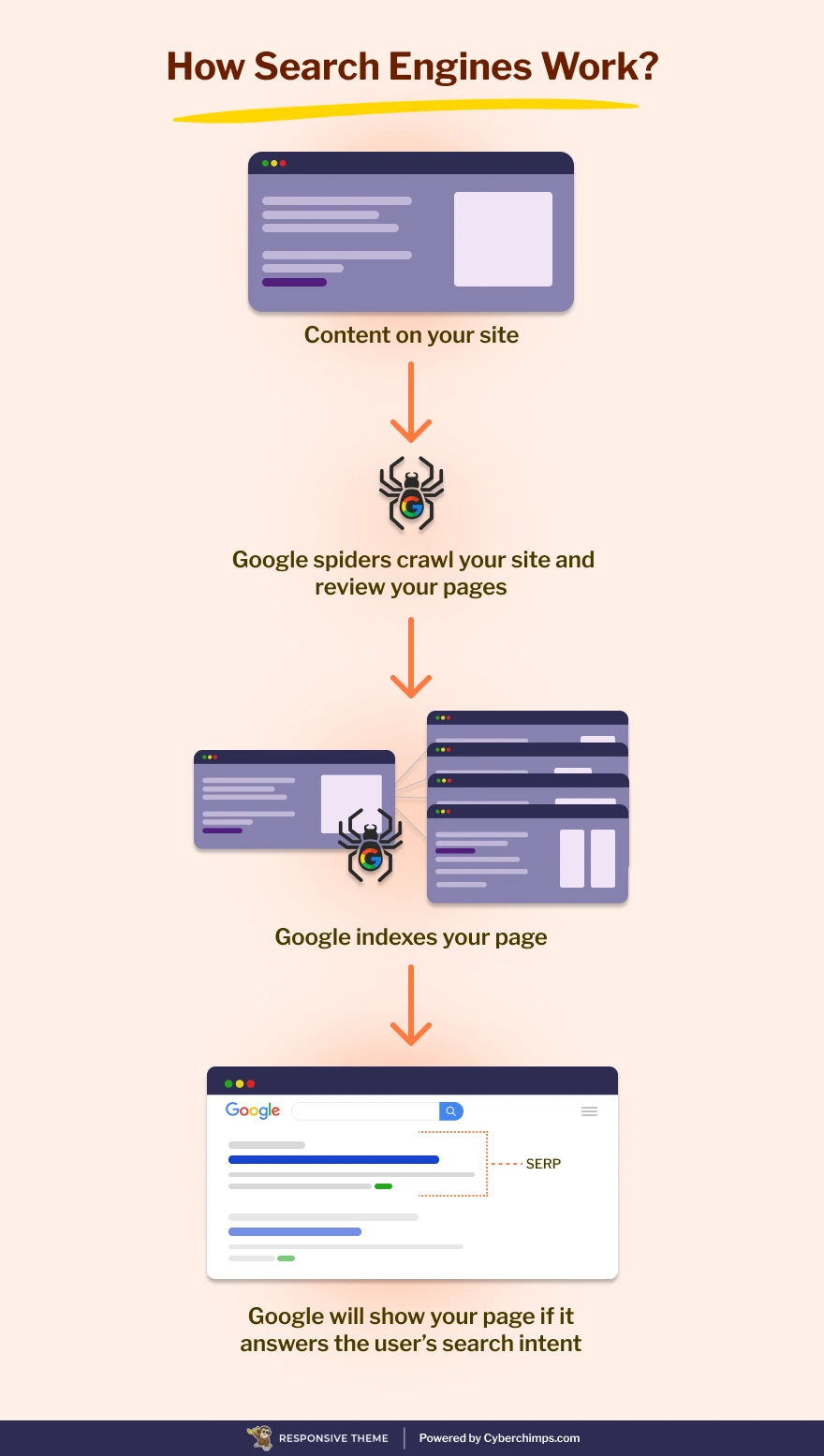
Crawling
Search engines send spiders to websites. These spiders are popularly termed search engine bots or crawlers. They crawl websites by jumping from links to links and scanning sitemaps submitted by businesses.
Indexing
The crawled information is processed and added to the search index.
Ranking
When a user enters a search query, the results most relevant to the query are ranked in the search results.
The third stage is ranking the results.
While Google’s content ranking process may not be fully transparent, there are clues that can provide valuable insights, empowering you to better understand and navigate the digital landscape.
Here are a few things observed in content ranking at the top of Google search results.
Usefulness
Usefulness provides website visitors with engaging, relevant, and valuable information. Content can be well-written and error-free, but it doesn’t meet the search intent if it doesn’t help users achieve what they want.
Relevancy
Relevance in search is a strategic focus, referring to the alignment between the search query and the desired search result. Websites that consistently deliver accurate and relevant results are often rewarded with higher rankings for their target terms.
Authority
Authority describes a website’s potential to rank in search results. Many third-party metrics try to provide a way to measure website authority directly.
Speed of Website
Consider the user experience: how quickly does the website deliver results? Is it a seamless experience, or does a slow load time detract from the quality of the content?
These are the questions Google considers when ranking results, and being attentive to them can enhance your website’s performance.
Google considers all these questions while ranking the results.
Technical SEO Parameters
Search engines certainly check for URL structure, number of internal and external links to the website page, type of content on the page, the core web vital score of the page, and whether it is a page with https. And many more conditions before ranking a page in search results.
Adding to the complexity, search engines now utilize machine learning techniques to better surface content, making it increasingly challenging to determine what leads to better or worse performance.
What are Organic Results vs. Paid Results
Search Engines show primarily two results when anyone searches for a keyword.
- Organic results – based on how good the website content is and its SEO
- Paid results – based on the advertisement bids for that keyword.
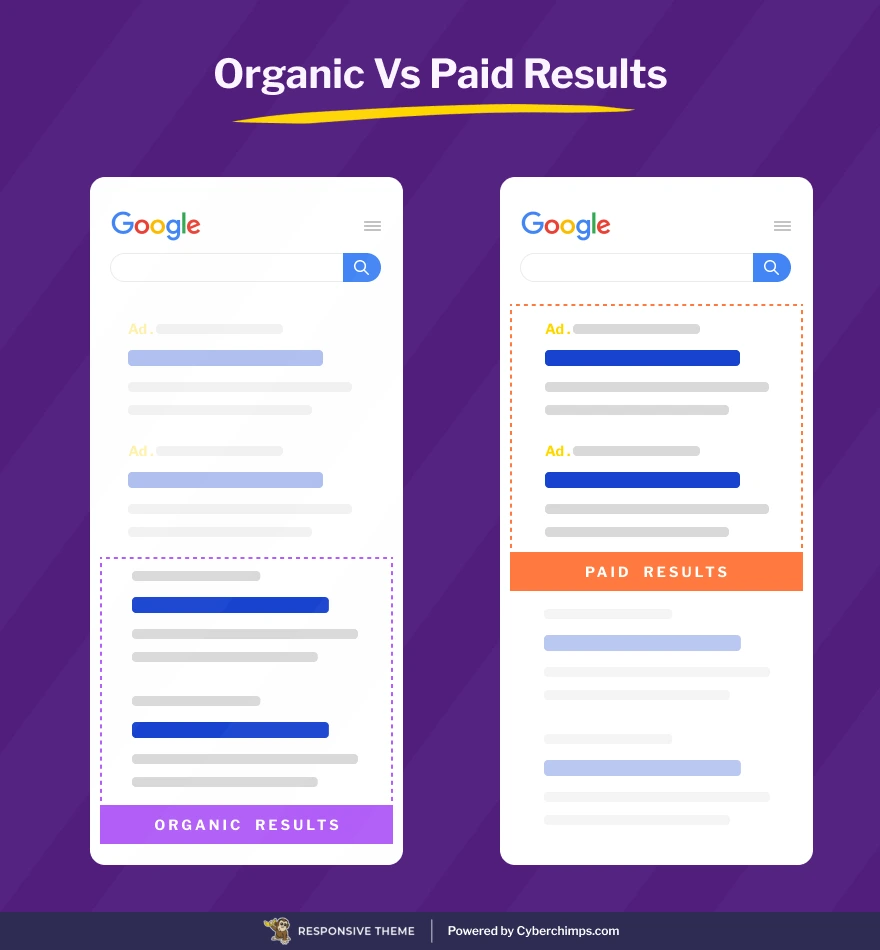
You have a basic understanding of SEO and how search engines work.
Lets understand a little about paid results.
PPC or Pay Per Click is a type of digital marketing where advertisers pay for getting clicks in the search results.
Advertisers strategically bid on targeted keywords or phrases, ensuring their ads prominently appear in search engine results and reach their ideal audience.
When a user enters particular keywords or phrases into a search engine, advertisements related to those terms prominently display among the top search results. This paid placement ensures the advertiser’s message is visible to potential customers actively seeking related products or services.
From a marketing perspective, both are important. It is advisable to use PPC in important events along with SEO for getting long term results.
Both are forms of search engine marketing. To summarize:
- In pay-per-click (PPC) advertising, the advertiser is charged each time a user clicks on their paid listing in the search results.
- Search result listings are not directly paid for with SEO. As mentioned, optimizing pages and websites requires time and investment, so it’s essential to recognize that organic search isn’t “free.”
Different businesses have different uses. Ideally, businesses should use either of the channels or both(if the budget allows) as per the requirement.
Paid ads do not relate to organic listings at all. They are ranked in entirely different ways, and this guide will not cover paid ads.
What are Backlinks?
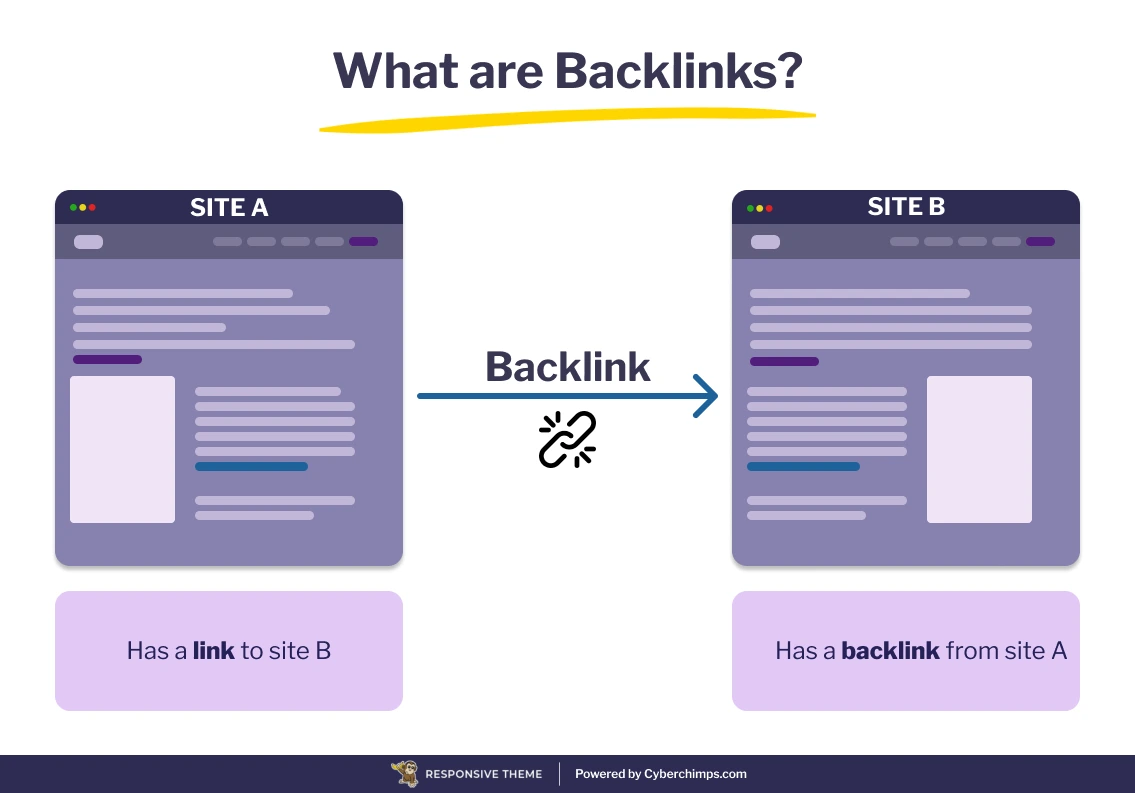
Backlinks are incoming links to your website from other websites. It’s an important SEO ranking factor.
Backlinks act as a vote of thanks. Generally, the more high-quality links you get from authority websites, the higher your chances of ranking in search engines.
Getting links to your website is a part of the off-page SEO process. We’ll discuss off-page SEO more later in this article.
Now that you know backlinks are a ranking factor, how do you get backlinks to your website?
There are several ways to get backlinks to your website and your content.
1. Earn Backlinks: Create high-quality content that people can link back to from their content. For example, a case study about a specific data set, a data analysis report, a statistical data presentation, and so on. Content creators are likely to link to your content if it adds a value point to their content.
2. Build Backlinks: You can build backlinks by asking people to link back to your content.
3. Broken Link Building: You can check for broken links on websites that can be replaced with your content.
And there are some other genuine ways to get backlinks to your content.
However, all the links are different.
When building links to your website, you should focus on getting relevant backlinks to your content. The links should not come from websites with lower authority than your content, as this may negatively affect your SEO effort in the long run.
Since getting high-quality backlinks is complex and challenging, they are considered upvotes for your website.
Factors that Influence Search Engine Rankings
Over 200 factors influence your website’s ranking in search results. Although all of these factors are unknown, they can be classified into some of the following categories.
Let’s start exploring.
On-page SEO
On-page SEO is optimizing your website content to rank in search engines.
To optimize on-page, you must create high-quality content that answers the user’s query. Your content should ultimately answer the question that the user had searched in Google or any other search engine.
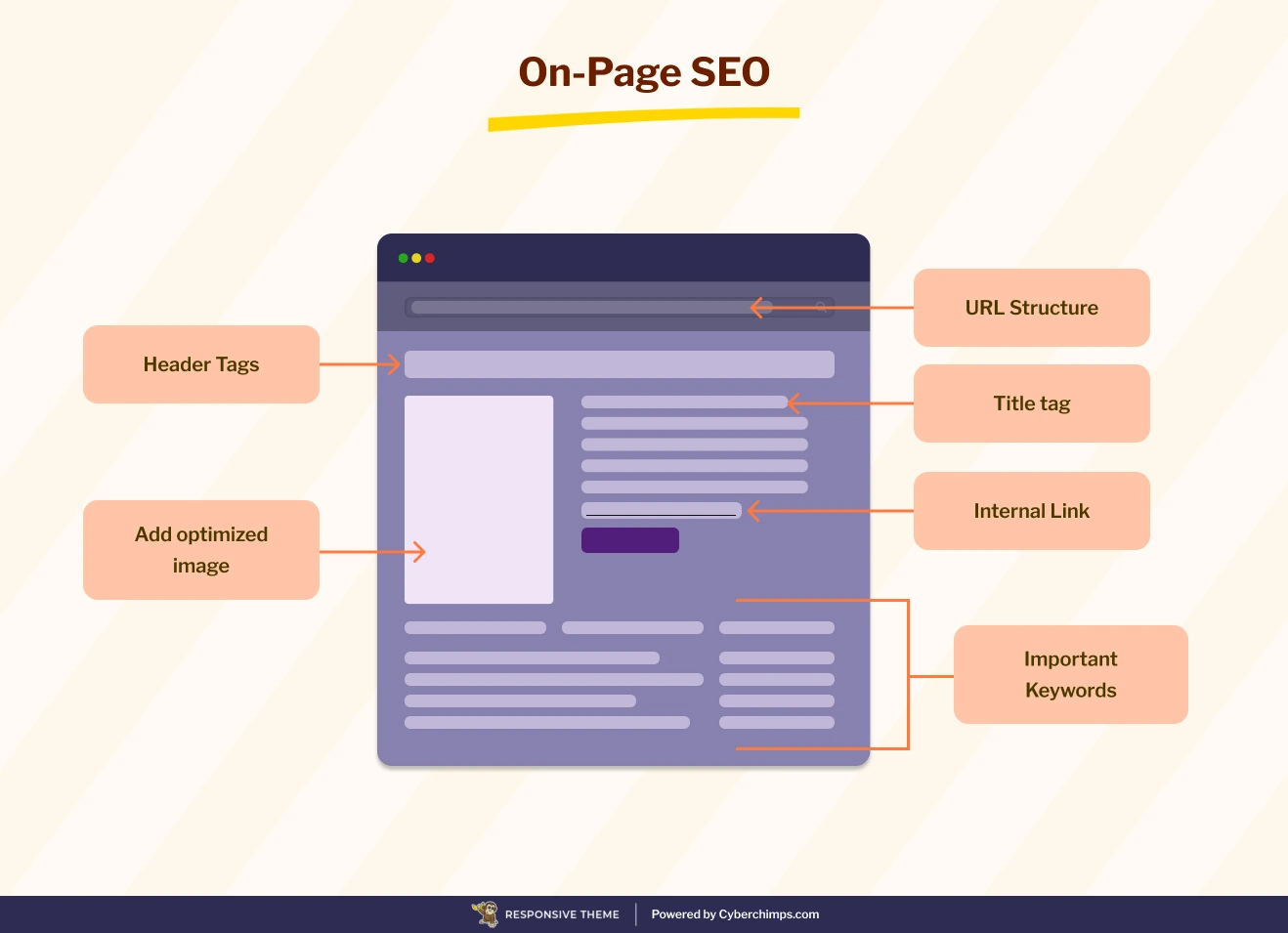
Now that all your competitors have answered the same question, your aim is to provide the most valuable information so that users stay on your website.
Points for writing content for on-page SEO:
- Writing content articles that cover your targeted keywords.
- Do proper keyword research and add keywords with high search volumes.
- Write unique content. Do not copy-paste content from other websites.
- Make sure your content is easy to read and understand.
- Ensure your article is free of grammatical errors.
- Writing engaging content that matches the search trends and provides correct information to the readers.
- Divide your content into readable paragraphs and write proper headlines.
For on-page search engine optimization, follow the below points:
Keyword Mapping: Keywords are the building blocks of SEO. Find keywords and phrases related to your website’s content and include them in your text.
SEO Tools like Google Keyword Planner can help you find popular and relevant keywords. If starting a new business website, target long-tail keywords with low keyword difficulty.
Title Tags: The title tag is a code that tells search engines what your page is about. Ensure it’s related to the page’s topic and includes your main keywords.
Meta Descriptions: A meta description is a summary below the title in search results. It should be relevant and exciting and include your main keywords.
Header Tags: Header tags (like H1, H2, H3, etc.) organize your content and show its structure. Use them to outline topics, emphasize key points, and add main keywords.
URL Structure: Keep your URLs simple and readable. Include your main keywords to make them clearer and easier to find.
Anchor text: Add relevant anchor texts that add more value to your content.
Internal Links: Include a good number of internal links to other articles on your website. This will ensure that your readers navigate to other articles and help search engines crawl content better.
Optimize Images: Use lightweight image files and formats like jpeg, jpeg, or webp to reduce image loading time. Ensure every image has a proper title and an elaborate alt text that explains the image.
Off-page SEO
Off-page SEO techniques and strategies are not directly related to your website but are inclined to your business ranking objectives.
Some of the common off-page strategies are:
- Link Building
- Guest Posting
- Digital PR
- Social Media Marketing
And more.
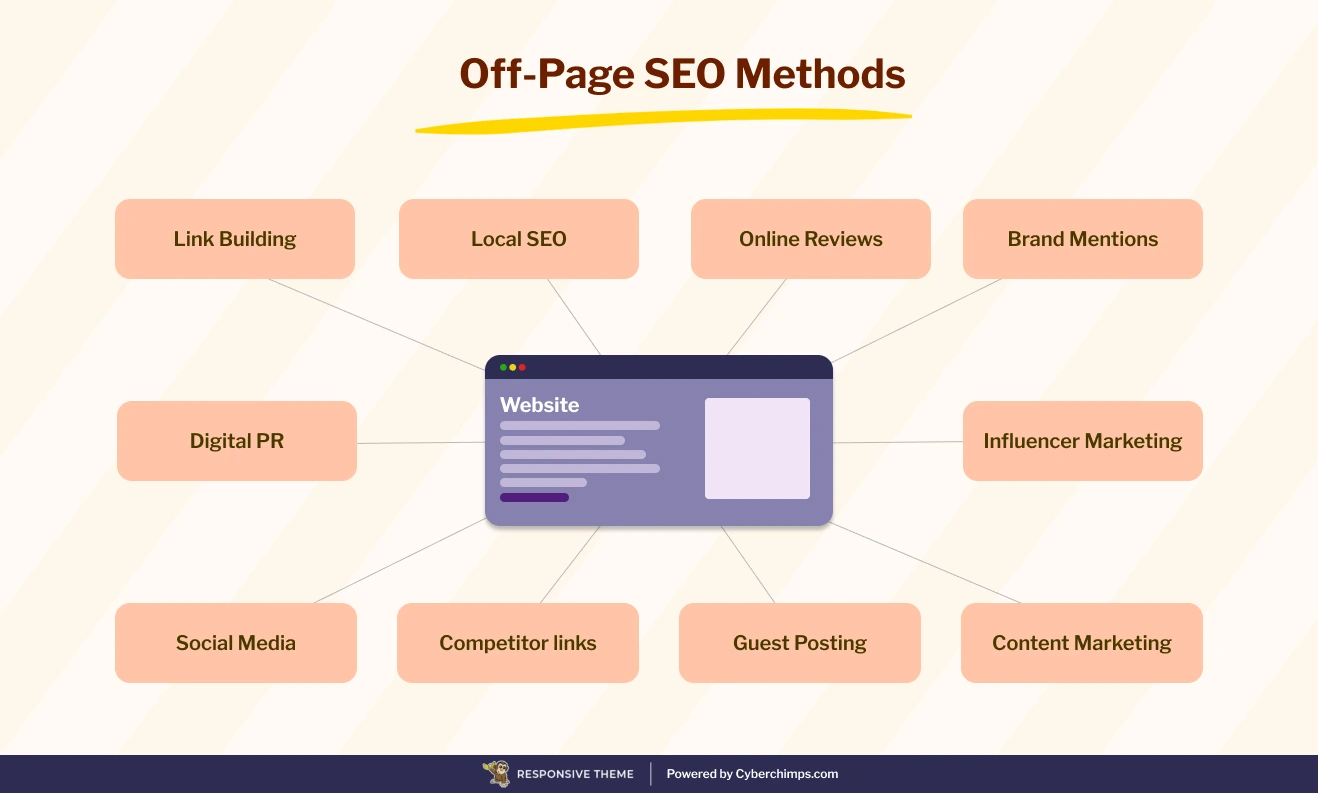
Let’s explore each method:
Link Building
It’s a process of getting links to your website. It helps in opening ways to reach your website through diversified channels.
When building links, the quality of links is more important than the quantity of links.
So, how do you get quality backlinks to your website?
1. Build Authoritative Content: If you publish very detailed content about a topic, people will likely link it. Your content can be a detailed article, a video, a tutorial course, a podcast, ebooks, and research case studies.
2. Search for Linking Opportunities: Look for content ranking in the search engines around a topic closely tied to your content—outreach to the website owners. Demonstrate the importance of linking their content to your content and how it will help users.
3. Fixing Broken Links: While looking for opportunities to link content, check for broken links in the ranking content. If you find a broken link, contact the website owners and ask them to replace it with your content.
Guest Posting
Try Guest posting for link building.
It can be a great way to get some early traction, but it’s essential to do it correctly.
If not, it can quickly shift from being a helpful strategy to feeling spammy—and search engines will pick up on that.
When executed correctly, guest posting can effectively gain exposure and add value to your collaborating sites.
Here are some tips to help you keep it clean and effective:
1. Stick to Relevant Sites: Always post on websites closely related to your niche. Getting your content on unrelated sites can send up red flags for search engines, so aim for quality, not just quantity.
2. Use Natural Anchor Text: Avoid keyword-stuffed anchor text for your links. Varying your anchor text across different posts can help keep things looking organic.
3. Don’t Overdo It: Guest posting should be just one part of your link-building approach. If guest posts make up a big chunk of your link profile, it may appear unnatural. So, keep it balanced!
When you take a thoughtful, quality-first approach to guest posting, you can gain valuable links and boost your exposure without becoming spammy.
Digital PR
Digital PR (Public Relations) is an online marketing strategy that aims to improve a brand’s visibility and reputation through digital channels.
It involves creating high-quality content or story campaigns and sharing them with online publications, influencers, bloggers, and social media platforms to reach a broader audience.
Unlike traditional PR, which focuses on newspapers, TV, and radio, digital PR leverages online platforms, including websites, social media, and search engines, to gain website links.
Some of the commonly popular ways for digital PR are:
- Share industry-wide revolutionary product releases with media houses.
- Creating data-driven content that shows statistics.
- Performing a personalized outreach to digital media houses and industry influencers.
- Hosting free webinars and events.
Social Media Marketing

Social Media Marketing is very different from SEO. However, it’s a great way to be available to customers searching for your business on social media platforms like Facebook, Instagram, Twitter, and many more.
Reach out to your users on social media platforms like Facebook, Twitter, Pinterest, and YouTube.
Start by creating a Facebook page and keep repurposing your content on your page.
Similarly, send regular tweets to update your users about your product and add relevant hashtags.
Likewise, you can create relevant boards on Pinterest that can direct engaged traffic to your website.
Technical SEO
Technical SEO refers to optimizing technical parameters like your website’s speed and performance. Your website’s loading speed, UX, and user experience significantly impact its SEO.
Besides, performance measurement metrics like Core Web Vitals determine how your website ranks in search engines. The main aim is to provide the best experience to end users who come to search engines to ask questions.
Some of the essential aspects of technical SEO are:
- Make sure you have a clean URL structure for articles
- Submit a sitemap to search engines
- Establish a clean navigation structure
- Make your website secure by adding an SSL certificate
- Upload images in Webp format
- Add internal links from your articles to other pages on the website
- Build pages that are optimized for Mobile
- Use a responsive design by selecting a good WordPress theme
SEO Strategies: Black Hat vs. White Hat
SEO takes time and effort.
Any practice that adds value to customers and helps them get answers to their queries is considered White hat SEO.
It needs consistent input of quality content, on-page work, and off-page SEO strategies.
Since it requires a lot of work and attention, SEO executives try to hack the ranking system with wrong practices. Such methods are called Black Hat SEO practices.
Depending on the type of SEO strategies, we can broadly categorize them into three types:
- White Hat SEO
- Black Hat SEO
- Grey Hat SEO

White Hat SEO Practices
Following healthy search engine guidelines and writing content that helps users comes under white hat SEO practices.
- Write valuable content for users on your website.
- Passing internal links to relevant articles.
- Improving navigation on your website.
- Getting value-adding backlinks to your website from trustworthy websites.
Black Hat SEO Practices
Black SEO practices refer to all activities that aim to fool search engines into ranking website content. Such practices harm your website and increase the chances of getting penalized by search engines.
- Adding links to spammy sites
- Keyword stuffing
- Redirecting users to pages different from the intended pages.
- Copy pasting the content from other websites and adding to your website
- Getting backlinks to your website from spam sites
Grey Hat SEO Practices
Grey Hat SEO practices combine white hat and black hat techniques. Adopting such practices may result in penalties from Google and other search engines.
- Buying links from websites
- Passing links to other websites that do not add value
- Linking to spam websites
- Running Private Blogging Networks(PBN)
- Spinning articles using article rewriting tools
How Much Time Does SEO Take?
SEO is a time-consuming process. It’s a strategy for businesses that are aligned with the long-term goal of educating their users.
Unlike Pay Per Click(PPC), which gets you clicks instantly, SEO can take 3-6 months, provided that you consistently publish valuable content that increases engagement on your business website.
How Much Does SEO Cost?
SEO cost depends on the following factors:
- Number of hours you put in creating content.
- Number of people creating content
- Is the SEO team in-house or outsourced to an agency
- Type of content published – articles, video, graphics or link-building
There is no definite answer to the cost involved, but it is surely a long-term process that involves charges for creating content, hiring resources, training staff, and more.
Frequently Asked Questions
SEO stands for Search Engine Optimization. It’s the process of optimizing the website to rank higher on the search engine results page. In short, SEO helps get more traffic and visitors to your website.
SEO and PPC are different approaches to attracting visitors to your website. SEO is a free way to attract visitors, while PPC stands for pay-per-click advertising.
Usually, paid campaigns are performed to attract visitors immediately by showing them highly targeted ads in search engine results pages. Ads can be of different types, such as search text ads or display ads.
If you want to attract users for an extended period, focus on SEO. If you want a highly targeted audience for a specific event, try PPC.
SEO does not need coding knowledge. However, it’s an advantage if you understand the technical aspects of websites and coding. It will help you understand the requirements of technical SEO and guide developers with correct SEO solutions.
GEO stands for Generative engine optimization, whereas SEO is search engine optimization. GEO is an emerging category in search that optimizes content for visibility in answer engines like ChatGPT, SearchGPT, Microsoft Copilot, and Perplexity.
For YouTube SEO, the most important thing is to focus on the quality and content of Video topics. Further, you can optimize your videos by adding proper titles and descriptions that explain your video, scripts, relevant tags, and keywords people are searching around your topic on YouTube.
Conclusion
SEO looks simple, but it keeps evolving.
What used to work before may not yield results in the future. As a marketer or a business owner, you must continuously catch the changing trends in how people search the internet.
The latest trends show that people look for Videos and instant-answer mediums like generative AI and YouTube shorts to get answers to their queries.
To become good at SEO, you should:
- Read SEO books
- Check your competitor’s websites
- Learn the basics of writing good content
- Understand your customer search intent
- Check SEO tutorials
- Join SEO forums
- Read Newsletters
Look for other reliable SEO resources. Don’t stress learning SEO at once; it’s a process, and you’ll get better over time.
Next, you can read about:
Now that you have reached this page, if you’re looking to create a free website, you can sign up for the free Cyberchimps account.

